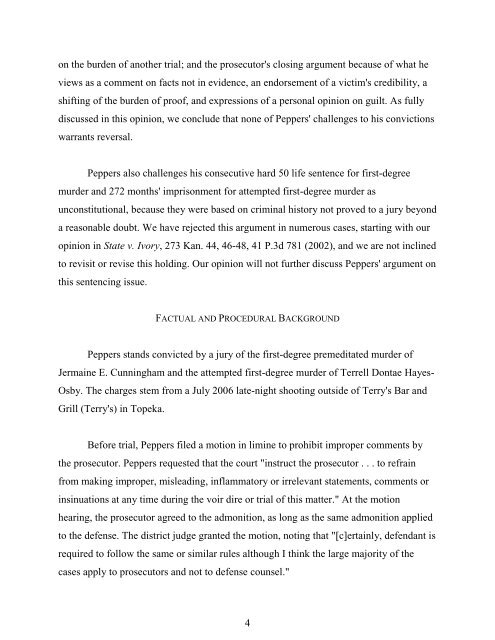Kansas Supreme Court - 101551 â State v. Peppers
Kansas Supreme Court - 101551 â State v. Peppers
Kansas Supreme Court - 101551 â State v. Peppers
You also want an ePaper? Increase the reach of your titles
YUMPU automatically turns print PDFs into web optimized ePapers that Google loves.
on the burden of another trial; and the prosecutor's closing argument because of what he<br />
views as a comment on facts not in evidence, an endorsement of a victim's credibility, a<br />
shifting of the burden of proof, and expressions of a personal opinion on guilt. As fully<br />
discussed in this opinion, we conclude that none of <strong>Peppers</strong>' challenges to his convictions<br />
warrants reversal.<br />
<strong>Peppers</strong> also challenges his consecutive hard 50 life sentence for first-degree<br />
murder and 272 months' imprisonment for attempted first-degree murder as<br />
unconstitutional, because they were based on criminal history not proved to a jury beyond<br />
a reasonable doubt. We have rejected this argument in numerous cases, starting with our<br />
opinion in <strong>State</strong> v. Ivory, 273 Kan. 44, 46-48, 41 P.3d 781 (2002), and we are not inclined<br />
to revisit or revise this holding. Our opinion will not further discuss <strong>Peppers</strong>' argument on<br />
this sentencing issue.<br />
FACTUAL AND PROCEDURAL BACKGROUND<br />
<strong>Peppers</strong> stands convicted by a jury of the first-degree premeditated murder of<br />
Jermaine E. Cunningham and the attempted first-degree murder of Terrell Dontae Hayes-<br />
Osby. The charges stem from a July 2006 late-night shooting outside of Terry's Bar and<br />
Grill (Terry's) in Topeka.<br />
Before trial, <strong>Peppers</strong> filed a motion in limine to prohibit improper comments by<br />
the prosecutor. <strong>Peppers</strong> requested that the court "instruct the prosecutor . . . to refrain<br />
from making improper, misleading, inflammatory or irrelevant statements, comments or<br />
insinuations at any time during the voir dire or trial of this matter." At the motion<br />
hearing, the prosecutor agreed to the admonition, as long as the same admonition applied<br />
to the defense. The district judge granted the motion, noting that "[c]ertainly, defendant is<br />
required to follow the same or similar rules although I think the large majority of the<br />
cases apply to prosecutors and not to defense counsel."<br />
4
















